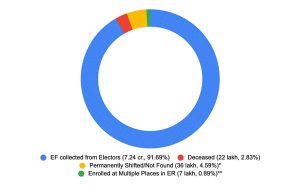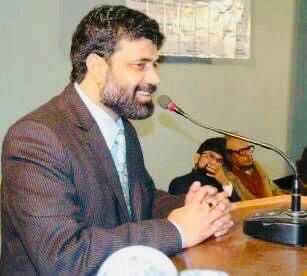Mass voter list deletion in Bihar has alarmed rights activists as 6 million names vanish. Shamim Ahmed demands accountability from Election Commission and government.
Patna, Bihar — August 6, 2025
Voter list deletion on a massive scale has triggered alarm across Bihar, with nearly 6 million names reportedly removed without clear explanation. The development has drawn sharp criticism from human rights activist Mr. Shamim Ahmed, who is demanding immediate clarification from the Election Commission of India (ECI) and the government.
Raising the issue in an exclusive statement to Qalam Times, Mr. Ahmed questioned the fairness and motive behind this voter list deletion, warning that the move could rob citizens of their right to vote and shake the foundations of democratic citizenship itself.
Mr. Ahmed, speaking exclusively to Qalam Times, urged the Election Commission of India (ECI) and the Government to urgently clarify their role and responsibility in the matter. He warned that this mass disenfranchisement may not only rob citizens of their constitutional right to vote but also jeopardize their legal identity and citizenship status.
“Where Did These 60 Lakh People Go?”
According to Mr. Ahmed, electoral records suggest that names of nearly 6 million eligible voters have mysteriously disappeared from the voter list in Bihar. He asked, “Did these people not vote in the 2020 elections? If they are now off the list, does that mean they are no longer citizens of India?”

He further posed a chilling question: “Is this government preparing to send them to detention camps, as feared during the NRC-CAA protests?”
Unrealistic Deadline for Identity Verification
The government has issued a 30-day notice for individuals to prove their identity and citizenship to remain on the voter rolls,a deadline that Mr. Ahmed criticized as “unreasonable and deeply unjust.”
“More than 70 to 80% of Biharis work in other Indian states or even abroad. They are laborers, daily wage earners, and low-income families. How are they supposed to produce documentation at such short notice?” he asked.
He argued that the process should have come with at least one year’s preparation time, especially considering the logistical and financial burden it imposes on migrant workers and poor families.
Bihar–Nepal Border: A Complicating Factor
Highlighting the unique geographic and social dynamics of Bihar, Mr. Ahmed pointed out that Bihar shares a long, open border with Nepal, not Bangladesh. Many families across the border are interlinked through marriage and trade. Citizens on both sides frequently travel without passports or visas.

“Given this reality, the identity verification process becomes even more complicated and sensitive. There is no illegal border crossing here,this is part of our historic relationship with Nepal,” he stated.
Beyond Religion: It’s Not Just Muslims
Rejecting the idea that the issue affects only Muslim communities, Mr. Ahmed emphasized that 85% of those whose names were removed are from Hindu backgrounds,including large numbers from Scheduled Castes (SCs), Scheduled Tribes (STs), and Other Backward Classes (OBCs).
“This is not a communal issue,it is a class issue. It affects the poor, the working class, and the marginalized. No one is being spared,” he warned.
Migration, Documentation & the Cost of Proof
Millions of Bihar’s residents live in other Indian states for employment. Many are required to obtain local documents like Aadhaar, PAN, and even Voter IDs in their current place of residence. This creates a conflict with their native state records, which the government appears to be using as a basis for disqualification.
Mr. Ahmed questioned that “How can these citizens be expected to abandon their jobs and rush back to Bihar just to submit documents? They have built homes with their life savings, hoping to retire in Bihar. Now, they’re being told they don’t belong.”
To understand the scale of migration from Bihar, here is a summary of the latest data:
| Data Source / Year | Estimated Migrants | Inter-State Migration (% of Population) | Households with Migrants (%) | Notes |
| Bihar Caste Survey (2023) | ~5 million (50 lakh) | — | — | Individuals living outside Bihar for work or education |
| IIPS Study (~2016) | — | ~90% of migrants work outside Bihar | — | Nearly 4 in 5 rural migrant workers leave Bihar for other states |
| Census of India (2011) | — | 1.07% | — | Only counts permanent inter-state migrants, not seasonal migration |
| Economic Survey (2001–2011) | ~2.7 million (27 lakh) aged 20–29 | — | — | Indicates large-scale youth migration for work |
| Media Reports (2025) | ~7.454 million (74.54 lakh) | — | — | Around 30% migrated specifically for employment |
These figures confirm what activists and sociologists have warned for years: Bihar is one of the most migration-prone states in India. Any attempt to verify voter identity must take this reality into account, or risk excluding millions of legitimate citizens.
Recurring Pattern of State Overreach
Mr. Ahmed placed this voter list controversy within a broader timeline of controversial state actions since 2014, including:
- Demonetization (2016)
- Citizenship Amendment Act (CAA)
- National Register of Citizens (NRC) pilot in Assam
“In each case, people were thrown into panic: lining up at banks, collecting citizenship documents, or fighting legal battles,” he said. “Now once again, the public is being forced to prove its legitimacy, instead of being empowered.”
Democracy in Question
Legal experts have warned that arbitrary voter deletions, especially without transparent public notice or legal recourse, amount to denial of democratic rights. This could be seen as a dry run of NRC-like tactics in other parts of the country.
Meanwhile, civil society organizations have called for transparency and immediate redressal.
Demands from Human Rights Advocates
Mr. Shamim Ahmed and other civil society leaders are calling for the following urgent actions:
- Immediate clarification from the Election Commission on how and why the voter deletions occurred.
- Extension of the deadline for identity verification to a minimum of 6 to 12 months.
- Public awareness campaigns to inform citizens of their rights.
- Establishment of help centers in migrant-heavy cities and border districts.
- A special independent inquiry to investigate the process and its fairness.
At a time when nations around the world are focused on inclusive development and strengthening democratic participation, India is witnessing millions of citizens struggling to prove their right to vote. For many in Bihar, this is not just about elections—it is a fight to hold onto identity, dignity, and citizenship.
As Mr. Ahmed concluded that no citizen should be made to stand in line again and again, just to prove they belong to their own country.








https://shorturl.fm/IiYsp
https://shorturl.fm/r9e7E